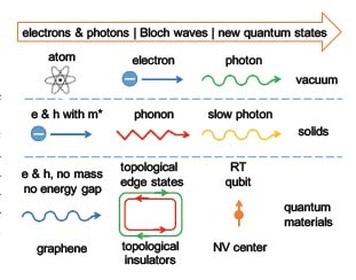|
Vision - Our Center's Vision is to create atomic-scale devices and systems based on quantum materials that
enable quantum sensing, quantum communication, and quantum computation. Quantum materials offer a unique new opportunity for communication and computation. They transform electronics and photonics from the classical to the quantum regime. Two-dimensional (2D) quantum materials naturally form atomically thin sheets with few defects, unlike conventional semiconductors. As the size of a structure is reduced from 10 nm CMOS node to the size of an atom 0.1 nm, the particle-in-a-box electron energy increases from 10 K to 100,000 K, well above room temperature. |
In quantum materials, new particles are created that have completely new characteristics. In a vacuum, data can be carried by atoms, electrons and photons. Inside a solid, Bloch waves yield new particles that are well understood: electrons with altered masses, slower photons, and phonons. But in quantum materials, the behavior is totally different: In graphene, electrons and holes travel ballistically with no mass and no energy gap, in Topological Insulators, protected spins circle in edge states with no applied magnetic field, and a nitrogen vacancy (NV) center in diamond can store a coherent qubit for > 1ms at room temperature. Quantum materials offer a new regime with new rules and new capabilities that open up possibilities for completely nonconventional devices. We can rethink the basics of electronics and photonics and introduce functionality that was previously impossible. Much initial work in this area has been a scientific exploration of quantum materials and their particle excitations. As we learn more, we can progress toward the incorporation of such materials into functional quantum devices and integrated quantum systems.
The strategic goal of our Center is to bring together outstanding investigators to push the frontiers of quantum sensors, quantum communication, and quantum computation. Our country must remain at the front of this rapidly growing field through scientific discoveries and the development of new 'quantum' technologies. Our Center's most important products are our students and postdocs, who will enter productive careers that advance the field. We offer a range of exciting activities that attract a diverse group of young students including a Summer School and academic year research projects, as well as an Annual Meeting and Retreat, weekly seminars, a Frontiers in Quantum Materials workshop, and new academic courses at Harvard and Wellesley. The Museum of Science provides a broader view by emphasizing the importance of science communication and the ability to involve the public in the evaluation of new ideas.
Our Center is ideally suited to pursing our goals. We have world-leading investigators and an outstanding set of collaborators inside the United States, including universities and national laboratories, and internationally. Our multidisciplinary team develops quantum devices and systems from new materials through a research cycle that combines theory - to suggest new materials with desired properties, growth - to create new materials, nanofabrication - to develop the technology needed to make quantum devices, and characterization - to evaluate and model the performance. Many cycles are typically needed to reach the goal, where information from one pass is used to improve the next.
The strategic goal of our Center is to bring together outstanding investigators to push the frontiers of quantum sensors, quantum communication, and quantum computation. Our country must remain at the front of this rapidly growing field through scientific discoveries and the development of new 'quantum' technologies. Our Center's most important products are our students and postdocs, who will enter productive careers that advance the field. We offer a range of exciting activities that attract a diverse group of young students including a Summer School and academic year research projects, as well as an Annual Meeting and Retreat, weekly seminars, a Frontiers in Quantum Materials workshop, and new academic courses at Harvard and Wellesley. The Museum of Science provides a broader view by emphasizing the importance of science communication and the ability to involve the public in the evaluation of new ideas.
Our Center is ideally suited to pursing our goals. We have world-leading investigators and an outstanding set of collaborators inside the United States, including universities and national laboratories, and internationally. Our multidisciplinary team develops quantum devices and systems from new materials through a research cycle that combines theory - to suggest new materials with desired properties, growth - to create new materials, nanofabrication - to develop the technology needed to make quantum devices, and characterization - to evaluate and model the performance. Many cycles are typically needed to reach the goal, where information from one pass is used to improve the next.







